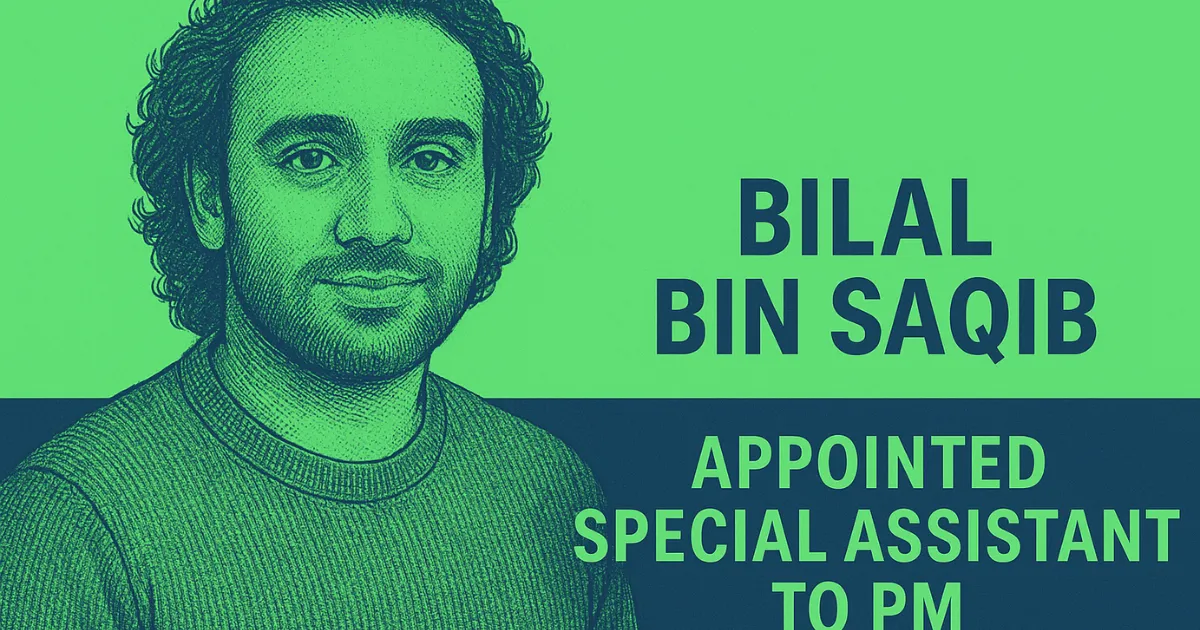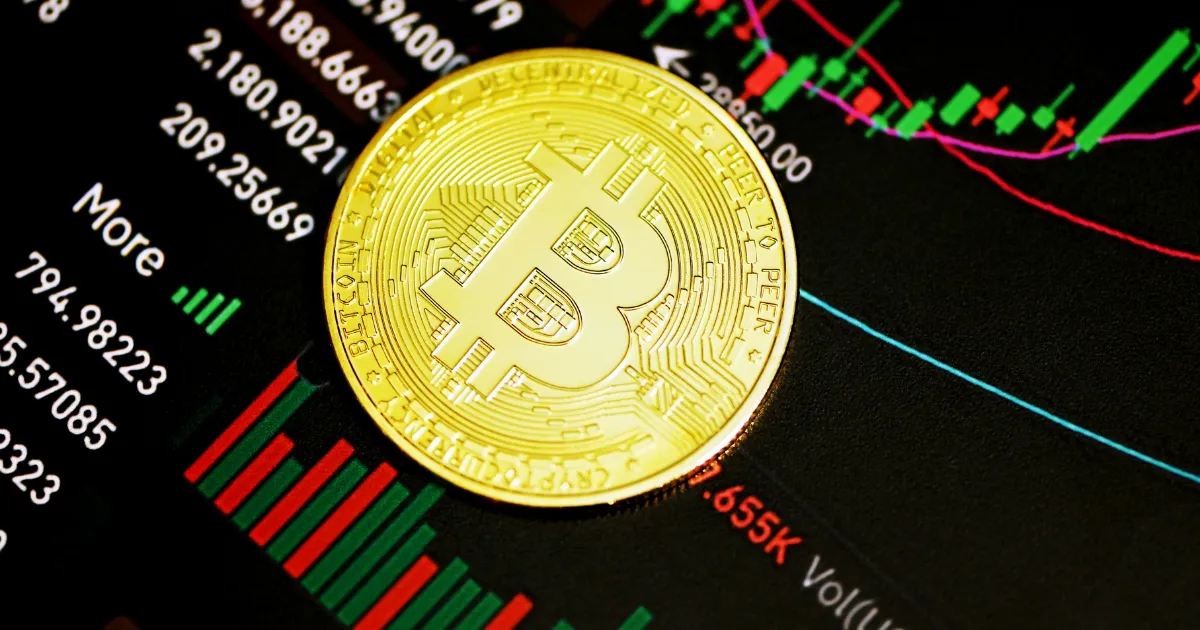Bilal bin Saqib’s Appointment Supercharges Pakistan Crypto Future

Why This Appointment Is a Turning Point for Pakistan Crypto
Young Pakistani entrepreneur and tech innovator, Bilal bin Saqib, now serves as the Special Assistant to Prime Minister Shehbaz Sharif on blockchain and crypto. Bilal bin Saqib’s new role marks a major shift in Pakistan’s approach to crypto. For years the country’s banks warned that virtual currencies were not legal tender, and even a finance minister declared in 2023 that Pakistan would “never legalize cryptocurrencies”. Now, with a crypto specialist on the PM’s team, the message is clear: Pakistan crypto policy is changing.
An alumnus of the London School of Economics (MSc in Social Innovation & Entrepreneurship), Bilal co-founded Tayaba – an NGO addressing Pakistan’s water crisis – which won him a spot in Forbes Asia’s 30 Under 30 list in 2020. In 2023, King Charles III awarded him an MBE (Member of the British Empire) for his “One Million Meals” COVID-19 relief work (delivering over 100,000 meals to UK frontline workers). Saqib is a globally recognized social entrepreneur turned crypto advocate.
This move comes amid bold steps like allocating 2,000MW of power to Bitcoin mining projects and AI data centers. Recently, Binance founder Changpeng Zhao became Strategic Adviser to the Pakistan Crypto Council. This steps position Pakistan alongside forward-leaning nations. Arab News notes this puts Pakistan “among a handful of nations, including the United States, the UAE and El Salvador, which have dedicated blockchain and cryptocurrency leadership”. In government statements, officials say Bilal’s appointment shows Pakistan’s “commitment to aligning with global trends”.
- Sign of legitimacy. By giving Bilal minister-of-state status (without salary) and tasks like drafting a FATF-compliant crypto framework, the government is legitimizing what was once an informal market.
- Boost to tech investment. Investors and entrepreneurs now have a clearer ally in government. This can spur foreign investment (recall that even Trump-affiliated firms have reached out to Pakistan’s crypto sector recently).
- Global signal. The U.S. just set up a crypto working group and India is only now reviewing its crypto policy. Pakistan’s proactive stance signals it wants to lead rather than lag.
Together, these factors make Bilal bin Saqib’s appointment a watershed moment: Pakistan crypto has officially gained high-level support.
What’s Next for Pakistan Cryptocurrency Regulation?
Now that Pakistan has a crypto czar of sorts, what can we expect next? In practical terms, Saqib will spearhead crafting real rules and infrastructure for digital assets. Recent statements and plans hint at several moves:
- Establish the Pakistan Digital Assets Authority (PDAA): The finance ministry has proposed a dedicated regulator to oversee licensing of exchanges, custodians, wallets, stablecoins and DeFi platforms. This body would also “tokenize national assets and government debt” and use excess power for regulated Bitcoin mining. In short, authorities will aim to convert Pakistan’s surplus electricity into a national crypto export machine.
- Formalize Bitcoin mining. The cabinet has approved 2,000MW for mining farms. Bilal’s job will include launching state-backed mining projects and converting power into foreign revenue. Expect announcements of mining zones and possible joint ventures with energy companies.
- Regulate Exchanges and VASPs. Laws will likely require crypto exchanges, brokers and “virtual asset service providers” (VASPs) to register and follow AML/KYC rules. Saqib has emphasized the need for FATF-compliant regulations, balancing innovation with national security. New rules will probably mirror global norms for licensing, reporting, and consumer protection.
- Blockchain in governance. The government may pilot blockchain for land records, finance and identity systems, as envisioned in Bilal’s mandate. This could improve transparency in public services.
- Innovation sandboxes and education. Saqib has called for “regulatory sandboxes” to safely test fintech and blockchain ideas. Expect programs to train Pakistani youth in crypto and AI, building on the country’s tech-savvy demographics.
Pakistan cryptocurrency regulation is about to get a complete overhaul – moving from a blanket ban to a structured, innovation-friendly regime. Experts point out that by formalizing rules, Pakistan can tap an estimated $300 billion informal crypto market (per industry estimates) and turn risks into growth.
Regional and Global Crypto Trends: How Pakistan Fits In
Pakistan’s move must be seen in a regional and global context. Around the world, approaches to crypto vary: the United States recently created a national crypto working group; the UAE and Saudi Arabia are rolling out blockchain-friendly policies; and tiny El Salvador famously made Bitcoin legal tender. In contrast, India is still cautious – only now “reviewing its stance” amid global changes.
In this global mix, Pakistan stands out. A Chainalysis report ranked Pakistan 9th worldwide in crypto adoption in 2024, and the number of Pakistani crypto users is already estimated in the tens of millions. (Statista even expects ~27 million users by 2025.) Pakistan has a very young population (about 70% under age 30) and roughly 50,000 IT graduates entering the workforce each year – demographics that strongly favor digital asset use. With this backdrop, the government’s new crypto push could make Pakistan a leading market in Asia.
- Adoption: Pakistan already ranks among the world’s top crypto adopters. Only a few countries have higher grassroots usage, and Pakistan outpaces many neighbors.
- Policy: By creating a special crypto advisor role, Pakistan joins the club of progressive countries. This mirrors steps in the U.S., UAE, etc.
- Opportunities: Pakistan’s strategy reflects its strengths: abundant (and cheap) energy, strong tech freelance community, and a youthful population. If managed well, it could follow global trends toward digital economies and even become a regional crypto hub.
In summary, Bilal bin Saqib’s appointment signals that Pakistan crypto is about to enter a new era – one where regulation, innovation, and global engagement go hand-in-hand For the Pakistani public, this could mean more clear rules, official exchanges, and broader acceptance of crypto as an economic tool, aligning our country with 2025’s leading digital economies
About the Author: Sarah Zimmerman is a seasoned crypto and Web3 news writer passionate about uncovering the latest developments in the digital asset space. With years of hands-on experience covering blockchain innovations, cryptocurrency trends, and decentralized technologies, she strives to deliver insightful and balanced news that empowers her readers. Her work is dedicated to demystifying complex topics and keeping you informed about the ever-evolving world of technology.

Published on Other News Site



















